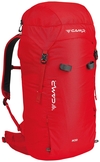Everest: Sherpa leave Base Camp, spring climbing season uncertain

 1 / 8
1 / 8 Manuel Lugli
Manuel Lugli
A decision of this sort would obviously cancel the entire spring climbing season, something that has never happened before and something that would have important repercussions not only on the Khumbu region but also for the entire country that reportedly earns circa $3.5 million per year from the Everest climbing fees.
Given the entity of the tragedy and the ill-feeling at Base Camp, some commercial expeditions cancelled their plans a few days ago such as Alpine Ascents International who stated "We have all agreed the best thing is to not continue this season's climb, so that all can mourn the loss of family, friends and comrades in this unprecedented tragedy."
During a meeting last Sunday at Base Camp the Sherpas made numerous demands to the Nepalese government, above all realted to their pay and insurance. While the Ministry of Tourism hads promised answers by Tuesday 22 April, according to the latest reports an agreement taht satisfies all parties has not yet been reached. The requests in the ultimatum include an immediate increase of the relief sum for the families of the 16 avalanche victims (British journalist Ed Douglas told Planetmountain "The $400 compensation deal was regarded as derisory, given how much the government makes from Everest and the risks Sherpas take."), as well as 2 million rupees insurance payment for those killed on Everest (circa 15,000 euro) and payment of all medical expenses to treat the injured.
Underlining that never before has there been a crisis of this magnitude seems superfluous, and at present there are more questions than answers. Such as, for example, what will happen to the fees – minimum $10,000 per capita – already paid by the climbers who will perhaps now not even be able to set foot on the mountain. Nepal is considered one of the poorest countries in the world and the loss of an entire season is particularly serious therefore.
"Everest is incredibly political" explained Douglas, who was with Everest expert Elizabeth Hawley when news first came in about the avalanche. "Like all major tourist attractions in Nepal, there's a nexus of struggle between the authorities, the locals and business. Climbers, Trekkers and tourists aren't much considered in this process. I do think this terrible loss of life will be the catalyst for major changes."
Regardless of these economic difficulties that will sooner or later be resolved, it now seems as if the Sherpas have decided to take things into the own hands and return home as a sign of respect. According to The Guardian, Sherpa Tulsi Gurung told AFP "We had a long meeting this afternoon and we decided to stop our climbing this year to honour our fallen brothers. All Sherpas are united in this."
But the last word has not been said and according to Alan Arnette the Nepalese government is currently sending an official to Everst Base Camp in a last-ditch attempt to find a solution. The final decision, about how this season will evolve, has yet to be taken.
EVEREST AVALANCHE
20/04/2014 - Everest avalanche: search operation called off
19/04/2014 - Everest avalanche: interview with Simone Moro
18/04/2014 - Tragic Everest avalanche, numerous victims



 Copia link
Copia link







 See all photos
See all photos






















